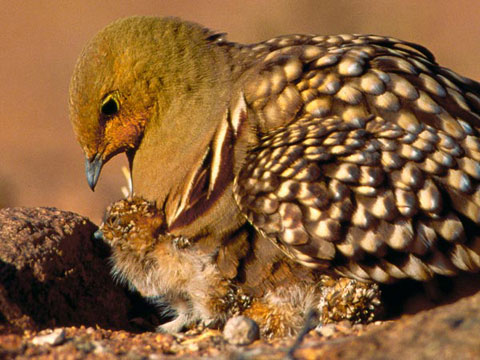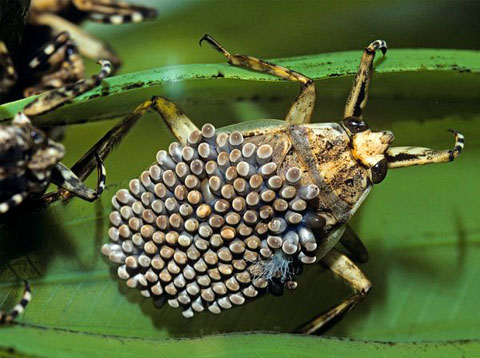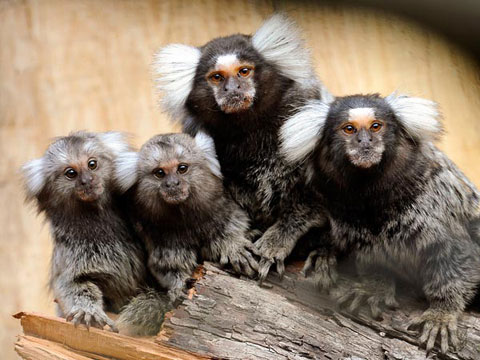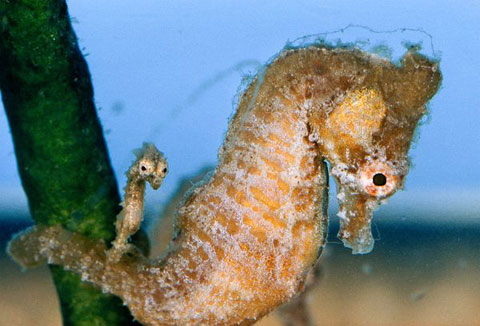10 most devoted fathers on the planet
While humanity celebrated Father's Day yesterday, the scientists also turned to fathers who took care of their children with a very high sense of responsibility in the animal world.

Namaqua sand chicken incubates eggs in the Kalahari desert in South Africa. Unlike many chickens, Namaqua's chicken incubation task is undertaken by the male. Whenever they need to get water for their children, they come to the water source and dip the belly hair into the water. When they return to the nest, the chicks will drink water from their belly feathers. (Photo: Corbis)

Male giant water beetles are also diligent men. After mating, females lay eggs on the backs of males and secrete a substance that makes the eggs cling to the back. Males carry eggs for three weeks. During that time, it must avoid all enemies to ensure the safety of its children. Sometimes it rises to the surface to catch sunlight, a measure that makes mosses unable to grow on eggs. (Photo: Visual Unlimited)

Male squirrel-tailed monkeys not only carry babies but also feed and catch them. In addition, when females give birth, male squirrel-tailed monkeys also clean their babies by licking their bodies. The devotion of male monkeys stems from the fact that apes must sacrifice a lot during pregnancy and childbirth. The fetus of squirrel monkeys usually accounts for 25% of the maternal weight. (Photo: EPA)

Most of the children in the species give birth, but in seahorses, that responsibility. By the breeding season, female seahorses lay thousands of eggs in a bag in the male belly. Eggs hatch into children after about 15-20 days. Seahorses dad protect me until they can find their own food. (Photo: National Geographic)

A black swan neck swims on the lake with its cubs. Both males and females share the responsibility of raising children until they can live independently. (Photo: WCS)

In the breeding season, females in large ostrich species - an animal in South America - mate with many males. They then choose the drive of a male to lay about 50 eggs in it. Males make a nest that will incubate eggs for 6 weeks and take care of the young. It will attack all animals near the young, including the female ostrich.

A male barking frog sits near its eggs near a stream in Texas, USA. After female frogs lay eggs under rocks or logs, male frogs take care of eggs very well. They lie next to the eggs all day to regularly irrigate the eggs when the eggs are dry. When eggs hatch into tadpoles, male frogs often swim next to them. If there is a dangerous situation, the father frog opens his mouth to tadpole. Then the father frog closed his mouth to protect him. (Photo: Alamy)

Blank emperor penguins always suffered negative temperatures during incubation. After the female lays the only egg in the nest, the male will use their body to keep the egg warm. In 4 months the male barely leaves the egg, while the female prey on the sea. (Photo: squidoo.com)

Cockroaches are obnoxious bugs for humans, but scientists acknowledged that males of cockroach species are exemplary fathers. They mix the juice with wood pulp to make the nest, then look for food for the larvae. This is very unusual behavior in the insect world. Male cockroaches also hunt down bird droppings, nitrogen-containing things and are essential for larval development, to bring back to the nest. They also regularly clean the nest to prevent mold growth. (Photo: National Geographic)

In the world of monkey monkeys, a primate species distributed in South America, males take on most of the responsibility for raising children. Males and females form pairs in most of their lives. (Photo: AP)
- Great fathers in the animal world
- The most devoted fathers in the biological world
- The best fathers in the world
- The mother has a child at the same time as ... two fathers
- The old father is easy to die soon
- Mother's behavior is the key to her father's care for children
- Learn the origin and meaning of Father's Day 2018
- The most Earth-like planet shows up
- 99.99% has the 9th planet in the solar system
- The 9th planet has ice-covered iron core
- Close-up photo of planet Lk C15 was born
- Fluttering new evidence of the existence of the 9th planet
 Animal 'suffering' after hibernation
Animal 'suffering' after hibernation Why do goats climb well?
Why do goats climb well? Scientists were surprised to see chimpanzees eating turtles
Scientists were surprised to see chimpanzees eating turtles Giant catfish died deadly due to drought in Thailand
Giant catfish died deadly due to drought in Thailand